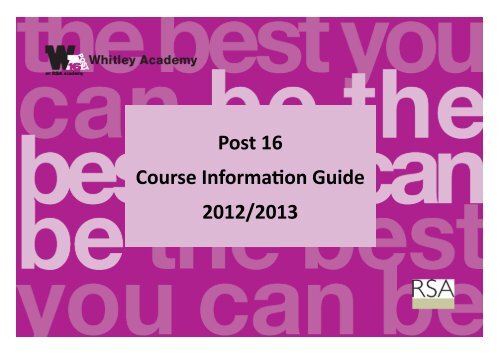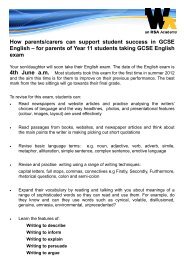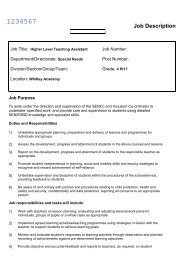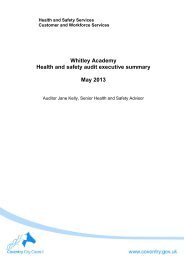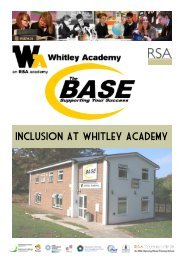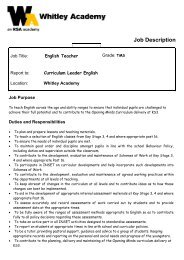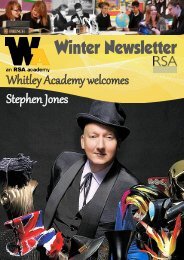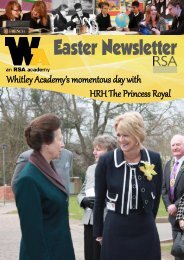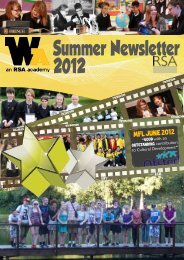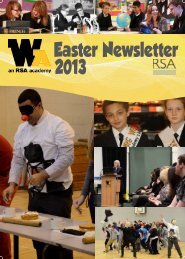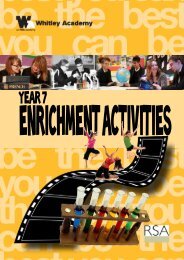Post 16 Course Information Guide 2012/2013 - Whitley Academy
Post 16 Course Information Guide 2012/2013 - Whitley Academy
Post 16 Course Information Guide 2012/2013 - Whitley Academy
- No tags were found...
Create successful ePaper yourself
Turn your PDF publications into a flip-book with our unique Google optimized e-Paper software.
<strong>Post</strong> <strong>16</strong><strong>Course</strong> <strong>Information</strong> <strong>Guide</strong><strong>2012</strong>/<strong>2013</strong>
General <strong>Information</strong>Key DatesYear 11 Taster Sessions - 12 th to 22 nd November <strong>2012</strong>Year 11 <strong>Post</strong> <strong>16</strong> Applications Deadline - 21 st December <strong>2012</strong><strong>Post</strong> <strong>16</strong> Induction - 5 th July <strong>2013</strong><strong>Post</strong> <strong>16</strong> Enrolment - 2 nd and 3 rd September <strong>2013</strong><strong>Post</strong> <strong>16</strong> Residential Trip TBC<strong>Post</strong> <strong>16</strong> Entry RequirementsGood attitude to learning – at least an average of an 8 (determined byyour tutor and Year 11 SLG link)Attendance of at least 96%Punctual to all lessonsAt least 5 A*-C including English and MathsMeeting of grade requirements for each subject<strong>16</strong>-19 BursaryFinancial support is available for students via the <strong>16</strong>-19 Bursary, this canbe accessed on application when certain criteria are met. Moreinformation about the Bursary is available on request
Business<strong>Course</strong> TitleEdexcel Advanced GCE in Applied Business (Single Award:9721)/(Double Award: 9722)EntryRequirementsMerit or Distinction at BTEC Business including English Languageand Maths at grade C or above.Awarding BodyEdexcel<strong>Course</strong> LevelWhy choose thiscourse<strong>Course</strong>Content (AS)AS Level (Year 12)A2 Level (Year 13) leading to the full Edexcel Advanced GCE inApplied Business.GCE Applied Business, a nationally recognised qualification, isan exciting and demanding course. It allows students theopportunity to create a virtual business, looking into everyaspect of Marketing, Finance, Sales, Production and HumanResources.The course has been developed to equip students with theunderstanding and skills needed to prepare for a career inBusiness or, if they so choose, higher education.YEAR 12Unit 1: Investigating People at work- Externally assessed bywritten examinationUnit 2: Investigating Business- Internally assessed courseworkUnit 3: Investigating Marketing- Internally assessed courseworkProgressionRoutesAdditionalResourcesContactThe course will be useful to those students wishing to takeFinance, Marketing, Human Resource Management or anyBusiness related degrees. Those wishing to study for degrees inother subjects such as History, Geography or Politics will findknowledge of Business invaluable. With respect to employment,those students thinking of a commercial or professional careersuch as Personnel, Retailing, Marketing and Advertising will alsofind the course useful. A grounding in Business Studies is veryuseful for general management roles in a complete cross sectionof companies.AS Applied Business for Edexcel Double Award Text BookISBN: 978 1 872962 39 9Mr Price<strong>Course</strong>Content (A2)YEAR 13Unit 8: Business Development– 15 hours of ControlledAssessmentUnit 13: Organising an Event– Internally assessed courseworkUnit 14: External influences on Business– Internally assessedcoursework
English Literature<strong>Course</strong> TitleAwarding Body<strong>Course</strong> LevelGCE English Literature (A Level)OCRAS Level (Year 12)A2 Level (Year 13)<strong>Course</strong>Content (A2)The A2 consists of two additional units:Drama and Poetry pre-1800. A Shakespeare play is studied forSection A. Another play and a section of poetry is the focus forSection B. Assessment is a two hour closed book examination toanswer two questions.Why choose thiscourseThe course provides an exciting experience of literature past andpresent and focuses on understanding and appreciatingdifferent forms of writing, such as poetry, prose and dramabased on knowledge of the time of writing. There is considerablescope in the coursework units for students to follow theirpersonal areas of interest, but also support and guidance forthose who need it.Assessment is through a mixture of coursework and writtenexamination.EntryRequirementsTexts in Time. An extended coursework essay comparingthematic links between three literary texts from different timesof writing. Assessment is through coursework, one task totalling3000 words.A minimum of Grade B in English Literature is a requirement tojoin the course. Year 12 students must achieve at least Grade Dat the end of the AS segment of the course in order to proceed.In addition, prospective Year 12 students are asked to completea holiday task to prepare them for the start of the course.<strong>Course</strong>Content (AS)The AS/A2 course, is divided into four units, two for AS and twofor A2.The AS consists of two assessment units:Poetry and Prose 1800 - 1945. As the title suggests, the work ofone poet is studied for Section A and one significant novel formsthe basis of study for Section B. Assessment is a two hour closedbook examination to answer two questions.ProgressionRoutesAdditionalresourcesContactThis course could lead to a degree in English Literature as well ascourses or careers in varying aspects of the media, publishing orcommunication, and teaching.Whilst some texts will be provided, students are required topurchase some of their own. The approximate cost of the textsfor each year is £15.00.Mrs SeckerLiterature <strong>Post</strong> 1900. This coursework portfolio will consist oftwo pieces of writing, one a close study of a section of textchosen by the student, the other an investigation of linksbetween at least two literary texts, one published since 1900.Assessment is through coursework, two tasks totalling 3000words.
Art and Design<strong>Course</strong> TitleAwarding Body<strong>Course</strong> LevelBTEC Level 3 in Art and DesignEdexcelYear 12 - BTEC Level 3 Certificate in Art and Design.(1 AS equivalent.)The one year course comprises of 5 hours of timetabled lessonsand 5 hours of directed private study time each week.Year 13 - BTEC Level 3 Subsidiary Diploma in Art and Design.(1 A Level equivalent)BTEC Level 3 90 – credit Diploma in Art and Design (equivalentto 1.5 A Levels)<strong>Course</strong>ContentAll assessment is done through assignment briefs to units ofassessment, creating a portfolio of evidence that meets therequirements of Edexcel internally assessed by Arts staff andexternally verified by Edexcel. This portfolio is then the passportto foundation courses and degrees in Art.This course is from the Edexcel Art and Design BTEC Level 3specification and will cancel out other qualifications from thesame specification, for this reason students should select eitheran Edexcel BTEC Level 3 in Art and Design or Edexcel BTEC Level3 Diploma in Art and Design (Graphic Design).Still Life Assignment , Portrait Assignment,Make Art not War Assignment, Work, Rest and Play Assignment(Assignment titles change each year after student feedback)BTEC Level 3 Diploma in Art and Design (equivalent to 2 ALevels)The BTEC Level 3 Subsidiary Diploma course comprises of 5hours of timetabled lessons and 5 hours of directed privatestudy time each week.The BTEC Level 3 90 credit Diploma course comprises of 5 hoursof timetabled lessons and 8 hours of directed private study timeeach week.The BTEC Level 3 Diploma course comprises of 5 hours oftimetables lessons and 10 hours of directed private study timeeach week. The course is only suitable for students capable ofindependent study and hard work.EntryRequirementsProgressionRoutesAdditionalresourcesContactBTEC first in Art at merit or above or a GCSE Grade B in Art. GCSEEnglish and Maths Grade C. Independent learning is mandatory andinability to work without guidance or willingness to adapt wouldpreclude individuals from considering a course in Art and Design.This course allows access to a large number of degree courses.Such as Photography, Fine Art, Illustration, Architecture, Fashiondesign, Interior design, Animation, Ceramics.Costs towards materials, including photocopying, sketch books,portfolios and other materials will be approximately £30 peryear.Mrs BradshawWhy choose thiscourseYou will learn a diverse range of skills to an array of Art andDesign based units from Edexcel BTEC. This course combinesunits of assessment in Art, Photography and opportunities inTextiles and 3D work.
Photography<strong>Course</strong> TitleAwarding BodyGCE in Photography (A Level)Ed Excel<strong>Course</strong> Content(SubsidiaryDiploma)The A2 consists of two Additional units:Unit 3 60% - <strong>Course</strong>work, practical work, personal study<strong>Course</strong> Level<strong>Course</strong>DetailsWhy choose thiscourseAS Level (Year 12)A2 Level (Year 13)The AS/A2 is spilt into four units . Two being coursework basedand two exam basedPhotography meets the needs of students who have an interestin photography, art, design and architecture and wish to studyfurther or take up careers in any of these fields, whetherpractical or academic.There is a focus on students formulating their own ideas from avariety of starting points, subsequently developing their ownphotography practice including the integration of theory,knowledge and understanding through researching the work ofothers.The course explores a wide range of mediums in photographyincluding film, video, digital imaging, studio and light sensitivematerial to equip students with a wide range of photographicskillsEntryRequirementsProgressionRoutesResourcesContactUnit 4 40% - is a second exam based unit that follows the samestructure as the AS with 8 weeks preparation time followed byan 12 hour exam over two days.If taken; C or above GCSE Art, Pass or above at BTEC. A realsense of commitment.This course presents students with the opportunity, if inpossession of other suitable qualifications, to proceed to higherlevel courses in Photography. In employment terms, the natureof the subject is also of particular interest to prospectiveemployers since it deals with processes involved in successfulbusiness practice, (Picture Editor, Advertising, Fashion, Medical,Industrial).We cover all photographic equipment but a few materials,including sketch books, portfolios and light sensitive photopaper if students chooses to pursue the darkroom side ofphotography will have to be funded by the students.Miss Noble<strong>Course</strong> Content(Certificate)The AS consists of two assessment units:Unit 1 60% - Lens and Light-based mediaUnit 2 40% - is exam based, with 8 weeks working towards atheme followed by an 8 hour exam spread over the course oftwo days
Geography<strong>Course</strong> TitleAwarding Body<strong>Course</strong> LevelWhy choose thiscourse<strong>Course</strong>Content (AS)GCE in Geography (A Level)OCRAS Level (Year 12)A2 Level (Year 13)This is an exciting and demanding course, clearly diverse innature. All of the units affect the world we live in. These unitsare issues that governments have to tackle around the worldtoday and in the future. Do you care? Do you have an opinion?Informed, you can make a difference. Informed you willunderstand better the world we live in.Assessment is through written examinations.Unit 1 Managing Physical Environments River environments Cold environments Coastal environmentsEntryRequirementsProgressionRoutesAdditionalresources Globalization Development and InequalitiesUnit 4 Geographic Skills Field study skills - (no project to be completed) Exam questions on Methodology, collecting recording andpresenting data. Analysis interpretation of dataGCSE grade C or above in English, Maths and Geography.A sound base for all areas of study. Students who completeGeography courses typically enter the following careers:-Accountancy, Business and Enterprise, Environmental, Peopleindustries, Services, Armed Forces, Local Council, Surveying,Town and Country Planning and Teaching.Students will be expected to go on two field trips over thecourse of two years. Costs for this vary between £45 and £80per trip.Unit 2 Managing Human Environments Managing Urban Environments Growth of Tourism The Energy IssueContactMr Elton<strong>Course</strong>Content (A2)Unit 3 Global Issues (environmental) Climate Hazards Ecosystems Under Threat Earth HazardsUnit 3B (Economic) Population and Resources
History<strong>Course</strong> TitleAwarding Body<strong>Course</strong> LevelWhy choose thiscourseGCE in History (A Level)EdexcelAS Level (Year 12)A2 Level (Year 13)A Level History offers students an opportunity to assess some ofthe most significant events, people and processes in History.Students will learn about the past in a variety of ways, from thetraditional methods of note taking and writing essays to morecollaborative work such as debates and presentations.Throughout the course students will be expected to analyse theevents of the past, evaluate a variety of opinions about whathappened as well as suggest and defend their owninterpretation.ProgressionRoutesAdditionalresourcesContactHistory is the second most favoured degree by employers.Students of History can aspire to a wide range of professionaland managerial careers including law, accountancy andmanagement.N/AMr J Butt<strong>Course</strong>Content (AS)In Year 12 students study two assessment units: Unit 1 Russia 1881 - 1953 Unit 2 Poverty, Public Health & Growth of Government 1830- 1875<strong>Course</strong>Content (A2)In Year 13 two additional units are studied: Unit 3 America 1917—1954 Hope, Depression, Superpower Unit 4 Project Crime and Punishment in Britain 1830 - 1965EntryRequirementsGrade C History and Grade C English Literature.
ICT: <strong>Information</strong> Communication Technology<strong>Course</strong> TitleGCE in Applied ICTassessed internally.Awarding Body<strong>Course</strong> LevelOCRAS Level (Year 12)A2 Level (Year 13)Unit G048 is compulsory. A further two units from units 10 to 14will be offered.For the advanced Subsidiary GCE:Why choose thiscourse<strong>Course</strong>Content (AS)The aims of Applied ICT are to encourage candidates to: Develop a broad range of ICT skills and knowledge of theuses of ICT skills and knowledge of the uses of ICT and toapply these, e.g. Planning, research, evaluation, problemsolving in vocational contexts. Develop knowledge and understanding of the components,functions and applications of information systems within arange of organisations and to develop an understanding ofthe impact of these on organisations’ personnel, policies andpractices; Develop an understanding of the main principles of solvingproblems using ICT and to adopt project management skillsto apply this understanding.This consists of three assessment units:Two units will be assessed internally, through a teacherassessedportfolioOne unit will be assessed externally with the assessmentset and marked by OCR.For the advanced GCE and additional:Two units will be assessed internally, through a teacherassessedportfolioOne unit will be assessed externally with the assessmentset by OCR, marked by the teacher and moderated byOCR.All units will be equally sized and equally weighted.<strong>Course</strong>Content (A2) Unit G040 - Using ICT to communicate - Portfolio assessedinternally Unit G041 - How Organisations use ICT - Assessed externally Unit G042 - ICT Solutions for individuals and society -Portfolio assessed internallyA2 Level has an additional three units from the following list: Unit G048 - Working to a Brief - Assessed externally Unit G049 - Numerical Modelling, Using Speadsheets -Assessed internally Unit G050 - Interactive Multimedia Products - Portfolioassessed internally Unit G051 - Publishing - Portfolio assessed internally Unit G051 - Publishing - Portfolio assessed internally Unit G052 - Artwork and imaging - Portfolio assessedinternally Unit G053 - Developing and creating websites - PortfolioEntryRequirementsProgressionRoutesAdditionalresourcesContactExternal assessments are 90 minutes and have pre-released case- study material which will be available to studentsapproximately six weeks prior to the examination dates.GCSE Grade C in Maths and English or AS grade D or above tocontinue to A2The GCE A-Level in Applied ICT qualifies for UCAS points so if youcomplete it successfully you could move on to study for a degreeor BTEC Higher National Diploma in related subjects such as ICT,Computer Science, <strong>Information</strong> Systems, Multimedia, SoftwareEngineering, Computer Networking, e-Business and <strong>Information</strong>Management. You could also go on to work based training suchas IT User/ Practitioner NVQs or vendor-specific qualifications.None needed.Mrs Bodycote
Mathematics<strong>Course</strong> TitleAwarding Body<strong>Course</strong> LevelWhy choose thiscourseGCE in Mathematics (A Level)EdexcelAS Level (Year 12)A2 Level (Year 13)Skills and concepts introduced at GCSE are studied in detail. ‘A ‘Level Mathematics is a very rewarding subject in whichcommitment and resilience count as much as plain mathematicsability. Students applying for ‘A’ Level Maths should keep inmind it is essential that weekly homework’s are submitted ontime and help from the Maths department is sought if thehomework’s are not understood. It is an essential part of thecourse to submit the weekly homework assessments. Studentswho do not meet the entry requirements outlined above may beconsidered in exceptional circumstances.EntryRequirementsProgressionRoutesAdditionalresourcesContactGCSE Grade B or betterAS Grade D or above to continue to A2Students who complete Mathematics courses could enter thefollowing careers:- Teaching, Engineering, Medicine, Accountant,Sales and Marketing, Science, Media, Insurance and Banking,Computing, Finance.Scientific calculatorMr M Skelton<strong>Course</strong>Content (AS)AS consists of three assessment units: Core 1 (Pure Maths) Core 2 (Pure Maths) Statistics 1 (Applied Maths)Assessment for AS Level is one modular exam in January andtwo modular exams in June.<strong>Course</strong>Content (A2)A2 has additional units: Core 3 (Pure Maths) Core 4 (Pure Maths) Mechanics 1 (Applied Maths)Assessment for A2 Level is one modular exam in January andtwo modular exams in June.
Further Mathematics<strong>Course</strong> TitleAwarding Body<strong>Course</strong> LevelWhy choose thiscourseGCE in Further Mathematics (A Level)MEIAS Level (Year 12 or 13)A2 Level (Year 13)Further mathematics is studied through the Further MathsNetwork at Warwick University and consortium schools. It bestudied at AS and A2 level.EntryRequirementsProgressionRoutesContactGCSE Grade A or A*AS Grade C or above to continue to A2.Students who complete Mathematics courses could enter thefollowing careers:- Teaching, Engineering, Medicine, Accountant,Sales and Marketing, Science, Media, Insurance and Banking,Computing, Finance.Mr M Skelton<strong>Course</strong>Content (AS)AS consists of three assessment units: Further Pure 1 (Pure Maths) Decision Maths 1 (Applied Maths) Further Mathematics Project UnitAssessment for AS Level is one modular exam in January andtwo modular exams in June.<strong>Course</strong>Content (A2)Three more modules are studied at A2 level which follow onfrom those studied at AS level. Various pure and appliedmodules are offered including Further pure 2, Statistics 2 andMechanics 2Assessment for A2 Level is one modular exam in January andtwo modular exams in June.
PE : SPORT<strong>Course</strong> TitleAwarding Body<strong>Course</strong> LevelWhy choose thiscourseBTEC Level 3 in SportEdexcelYear 12 - CertificateYear 13 - Subsidiary DiplomaThe certificate is equivalent to one AS Level and can get studentsup to 60 UCAS points. The Subsidiary Diploma is the equivalentof one ‘A’ Level which can get students up to 120 points. TheBTEC Level 3 is the natural progression for students who havetaken either GCSE PE or a BTEC Level 2 course. The BTEC isentirely coursework based, there is no formal exam at the end ofYear 12 or 13.These courses comprise of 5 hours of timetabled lessons and 5hours of directed private study time each week.The BTEC Level 3 course focuses on:1. Preparing students from post <strong>16</strong> into some form of sportsindustry work place.2. Giving pupils the knowledge and skills to be able tosuccessfully apply for and go to university.3. Giving students both practical and theoretical lessons on arange of different topics.EntryRequirementsProgressionRoutesAdditionalresourcesContactThree more units are studied in year 13 they are: Work Based Experience in Sport Practical Team Sports Sports CoachingMerit or distinction at Level 2 BTEC course or C grade GCSEPhysical Education and five A* to C at GCSE including Englishand Maths.The course is designed to prepare students for a career in a widerange of sporting environments or to give them the knowledgeto be able to apply for university sports courses. Specific jobsinclude Teaching, Coaching, Sports Development, Statistician,Physiotherapist, Sports Therapist, Sports Psychologist.Specialised Degrees can include Physical Education, EducationalStudies in PE, PE Teaching QTS and Sports Science.Lever Arch FolderPlastic Punch PocketsMr Billyeald<strong>Course</strong>ContentIn year 12 the current unit studies are: Anatomy and Physiology Physiology of Fitness Assessing Risk in Sport Fitness Testing for Sport and Exercise
Applied Science<strong>Course</strong> TitleAwarding Body<strong>Course</strong> LevelWhy choose thiscourseLevel 3 Diploma in Applied ScienceEdexcelYear 12 - Subsidiary DiplomaYear 13 - DiplomaSubsidiary Diploma is equivalent to 1 ‘A’ LevelDiploma is equivalent to 2 ‘A’ LevelsThese courses comprise of 5 hours of timetabled lessons and 5hours of directed private study time each week.The BTEC National in Applied Science offers a vocationalqualification. The course is designed to give learners theknowledge, understanding and technical skills to prepare themfor employment or to continue their study in higher education.The content is divided up into manageable sized topics allowingthe learning of new and exciting concepts to be secured beforedeveloping the skill of the application. This style of course willappeal to learners who prefer portfolio-based assessment;students will have to be committed throughout as the grading isthrough continuous assessment.EntryRequirementsProgressionRoutesContactstudents will study modules in: Using Statistics in Science,Informatics in Science, Physiology of Human Body Systems,Energy Changes, Sources and Applications, Genetics and GeneticEngineering, Practical Chemical Analysis and ChemicalLaboratory TechniquesMerit Level or higher in BTEC Applied Science at Certificate orDiploma Level 2. Grades C in Core and Additional Science atGCSE.BTEC National Award in Applied Science is a good academicoption which combines well with many other subjects, scienceand non-science based. The course can lead to employmentwithin a science laboratory environment, or can be used as astepping stone into a whole range of careers, e.g. lab technician,forensic scientist, botanist and medical physicist.Miss Ryan<strong>Course</strong>Content (AS)The course requires students to study aspects of Biology,Chemistry and Physics. The course develops students’ scientificknowledge and practical skills, as well as introducing new areas.Over the year students will study seven units covering:Fundamentals of science, Scientific investigations, ScientificPractical Techniques, Working in the science industry,Perceptions of Science and Using Mathematical Tools in Scienceand Mathematical calculations in Science.<strong>Course</strong>Content (A2)This course develops students’ scientific knowledge andpractical skills, as well as introducing new areas. Over the year
Biology<strong>Course</strong> Title<strong>Course</strong> TitleAwarding Body<strong>Course</strong> LevelWhy choose thiscourse<strong>Course</strong>Content (AS)GCE in BiologyAQAYear 12 - AS LevelYear 13 - A2 LevelBiology is an exciting course where key concepts within thenatural living world are studied and investigated. In the first yearyou’ll study three main topics: ‘Biology and disease’, ‘The varietyof living organisms’, plus a practical assignment designed tosharpen your investigative skills.Year two helps you build on that firm foundation and, like yearone, has two academic topics plus a practical assignment. Theacademic topics are ‘Populations and environment’, and ‘Controlin cells and organisms’. The practical assignment is where youinvestigate a different area of Biology.Taking Biology can provide an entry into a range of highereducation routes (not just science based) and can support manyemployment opportunities.Unit 1: Biology and Disease How digestive and gas exchange systems may be affected bycommunicable non communicable diseases. How knowledge of basic biology allows us to understand thesymptoms of disease and interpret data relating to riskfactors.Unit 2: The variety of Living Organisms The influence of genetic and environmental factors on intraspecificvariation. How the variety of life is reflected in similarities anddifferences in its biochemical basis and cellular organisation. How size and metabolic rate effect an organism’srequirements and give rise to adaptations.Unit 3: Practical and Investigative Skills Practical work in the contexts of Units 1 and 2 Assessment of implementing skills on practical work as awhole<strong>Course</strong>Content (A2)EntryRequirementsProgressionRoutesAdditionalresourcesContactIncludes a practical exam based upon an investigation thestudents complete in class.Requirement is a grade D or above at AS Level to continue ontoA2.Unit 4 : Populations and Environment How living organisms form ecosystems through which energyis transferred and chemical elements cycled. How human activity affects ecological balance in a variety ofways How genetic variation and isolation may lead to theformation of new species.Unit 5: Control in Cells and in Organisms Stimulus and responses - the biology of the nervous andendocrine systems Homeostasis and the maintenance of a constant internalenvironment Genes and genetic expressionsUnit 6: Practical and Investigative Skills Practical work in the contexts of Units 4 and 5 Assessment of implementing skills on practical work as awhole2 GCSE grade B’s or above in Core and Additional ScienceEnglish and Maths grade C or aboveBiology is a great choice of subject for people who want a careerin health and clinical professions such as medicine, dentistry,veterinary science, physiotherapy, pharmacy, optometry,nursing, zoology, marine biology or forensic science.Mrs Akram
Chemistry<strong>Course</strong> TitleAwarding Body<strong>Course</strong> LevelWhy choose thiscourse<strong>Course</strong>Content (AS)GCE in ChemistryOCRYear 12 - AS LevelYear 13 - A2 LevelChemistry is an important subject which links well with a varietyof others but has special relevance to careers concerned withfood, materials, engineering, environmental science,manufacturing, pharmacy and any branch of medicine. Thecourse followed does not aim simply to cover the principles ofthe subject but also to develop imaginative thinking andstudents are encouraged to put forward their own ideas andsuggestions and enter discussions. The emphasis is onunderstanding and many pupils build up a deep interest in thesubject, which is reflected in the number who decide to studythe subject, which is reflected in the number who decide tostudy the subject further. The course is practically based:concepts are developed and the principles tested byexperiment.AS UnitsF321: Atoms Bonds and Groups Atoms and Reactions Electrons Bonding and Structure Periodic TableExam Paper - 60 mins 15%<strong>Course</strong>Content (A2)EntryRequirementsF323: Practical Skills in Chemistry 1 Qualitative tasks Quantitive tasks Evaluative tasksAssessed internally - 10%A2 UnitsF324: Rings, Polymers and Analysis Rings, Acids and Amines Polymers and Synthesis AnalysisExam Paper 15%F325: Equilibria, Energetics and Elements Rates, equilibrium and pH Energy Transition elementsExam Paper 25%F326: Practical Skills in Chemistry 2 Qualitative tasks Quantitive tasks Evaluative tasksAssessed internally - 10%Minimum Grade B in Double Award GCSE ScienceMinimum Grade B in GCSE in MathematicsF322: Chains, Energy and Resources Basic Concepts and Hydrocarbons Alcohols, Halogenoalkanes and Analysis Energy ResourcesExam Paper 105 mins 25%ProgressionRoutesContact‘A’ level Chemistry opens many doors. Students have obtainedplaces on both college and degree courses. Some have enteredwork using their ‘A’ level. A number of ex students are workingabroad and some even decided to be teachers!Miss Denton
Physics<strong>Course</strong> TitleAwarding Body<strong>Course</strong> LevelPhysics B — Physics in ContextAQAYear 12 - AS LevelYear 13 - A2 Level<strong>Course</strong>Content (A2)A2 UnitsUnit 4: Physics inside and out Experiences out of this world What goes around comes around Imagining the invisibleExam Paper - 105mins 15%Why choose thiscourse<strong>Course</strong>Content (AS)Physics is an important subject which links well with a variety ofothers but has special relevance to careers concerned withspace, electronics, materials, engineering, environmentalscience, manufacturing and music. The course followed does notaim simply to cover the principles of the subject linking them toeveryday applications but also to develop imaginative thinkingand students are encouraged to put forward their own ideas andsuggestions and enter discussions. The emphasis is onunderstanding and many pupils build up a deep interest in thesubject, which is reflected in the number who decide to studythe subject. The course is practically based: concepts aredeveloped and the principles tested by experiment.AS UnitsUnit 1:Harmony and structure in the universe. The world of music. From quarks to quasarsExam Paper - 75mins 20%EntryRequirementsProgressionRoutesContactUnit 5: Energy under the microscope Matter under the microscope Breaking matter down Energy from the nucleusExam Paper - 105mins 20%Unit 6: Investigative and practical skills in A2Assessed internally - 10%Minimum Grade B in Double Award GCSE ScienceMinimum Grade B in GCSE in Mathematics‘A’ level Physics opens many doors. Students have obtainedplaces on both college and degree courses. Some have enteredwork using their ‘A’ level. A number of ex students are workingabroad and some even decide to be teachers!Miss RyanUnit 2: Physics keeps us going. Moving people, people moving Energy and the environmentExam Paper -75mins 20%Unit 3 : Investigative and practical skills in ASAssessed internally - 10%
Modern Languages<strong>Course</strong> TitleAwarding Body<strong>Course</strong> Level<strong>Course</strong>DescriptionGCE Modern Languages (French or Spanish)AQAOne Year <strong>Course</strong> AS LevelTwo Year <strong>Course</strong> A2 LevelThere are 4 Units across the Modern Language ‘A’ Level, with nocoursework or literature involved at AS; some writingpreparation is completed in the A2 year to respond to a writtenstimulus in the writing exam.. The speaking exams are on topicsof your choice which are decided in advance of the assessment.Where possible, pupils are provided with 20 min – 30 minuteminimum interactions with the Language assistant every week.The school also annually subscribes to a language learningenvironment on-line dedicated to the text material used in classand which is suitable for completing independent study.Additionally, students of a Modern Language will have access toa variety of visits including watching authentic films at theWarwick Arts Centre, a visit to London to evaluate and watchLes Misérables; the faculty also explores opportunities for ’A’level conferences in the Modern Language studied. The course issuitable for students capable of independent study and hardwork.<strong>Course</strong>Content (A2)EntryRequirementsProgressionRoutesContact1. The environment (Pollution, Energy, Protecting the Planet)2. Multicultural Society (Immigration, Integration, Racism)3. Social Problems (Poverty & Wealth, Public Order, Science/Technology)Grade C in a Modern Language GCSE, although a Grade ’B’ ispreferable. GCSE English and Maths Grade C. Independentlearning is mandatory and inability to work without guidance orwillingness to adapt would preclude individuals from consideringa course in a Modern Language. GCSE Grade B in a Language willbe acceptable for external candidates. A passion for Languagesis essential to follow this course.This course allows access to any number of degree courses andis assessed accordingly with many combinations of languagesand other subjects available at University; examples include lawand French as well as Mechanical Engineering and Spanish.University Degree/ERASMUS schemes overseas usingLanguages/Language ApprenticeshipsMr M Purslow<strong>Course</strong>Content (AS)1. Media (Television/Advertising/New Technologies)2. Popular Culture (Cinema/Music/Fashion)3. Healthy Living (Sport/Keeping fit/Work-life balance)4. Family & Personal Relationships (Parenting/Friendship/Marriage)
Other SubjectsAs well as the choosing from the expanding and wide range of subjects delivered at <strong>Whitley</strong> <strong>Academy</strong>, students also have the opportunity to take advantage of our consortiumarrangements with other <strong>Post</strong> <strong>16</strong> centres across the city and choose to study a more specialist subject, such as:● Economics● French● Health and Social Care● Law● Moving Images● Accounting● Theatre Studies● Media.If you are interested in studying a specific subject that doesn’t appear on any of the subject lists, please don’t hesitate to contact Mr Elton as the subject may be delivered at one of ourconsortia partners.


